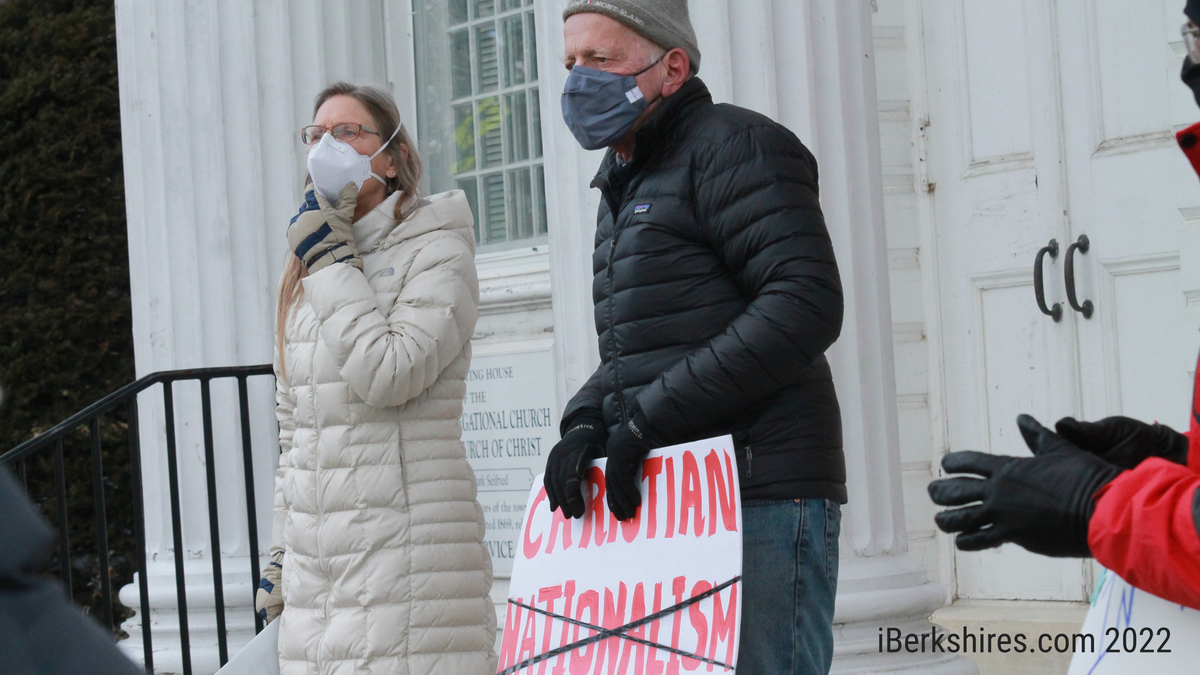
Organizers Betsy Burris, left, and Sherwood Guernsey address the crowd at Williamstown's First Congregational Church.
WILLIAMSTOWN, Mass. — The events of Jan. 6, 2021, spurred a local conversation about Christian nationalism.
But the roots of the issue go deeper than that.
"I came to the church in the '80s when the Moral Majority was coming into power in the United States," the Rev. Mark Seifried said on Thursday afternoon. "I say, 'coming into power' because they are a powerful force. I felt like it was incumbent for people of faith to offer a different perspective than they were offering.
"To offer a broader perspective, a pluralistic perspective, that's based in the teachings of Jesus. When Jesus was asked, 'Who is closest to the heart of God?' there were two religious men walking by and one pagan walking by. And Jesus pointed to the pagan, who was closest to the heart of God by the way he treated his neighbor."
Seifried was speaking from the steps of First Congregational Church, where he is interim minister, as the faith community hosted one of several area protests against Christian nationalism on the anniversary of the Jan. 6 insurrection.
In Williamstown, about 50 people held signs along Main Street (Route 2) and waved to passing motorists, who frequently returned the waves and tooted their horns in apparent support of the "
standout."
Organizers hope the event will raise awareness of what they characterize as a perversion of Christianity and a threat to democracy that was on display when supporters of President Donald Trump stormed the U.S. Capitol a year ago.
"I think we all consider this a step on a pilgrimage that we are all taking together," David Langston said. "I anticipate things are going to get worse before they get better. And it's going to require more coalition building, more preaching to other people and explaining to them what the real difficulties are that we face."
Berkshire District Attorney Andrea Harrington joined the Williamstown demonstration and told the crowd assembled that as the county's chief law enforcement officer, she was committed to protecting the right to vote.
Down the road in North Adams, dozens stood out on the front lawn of First Congregational Church on Main Street.
"We felt this was an invitation to our community, anybody of faith and goodwill to share their opinion on this," Lois Daunis, church moderator and member of the mission organization that helped organize the event said. "We reached out to other Christians, churches, the synagogue, and the community in general. Anyone who wants to join us."
Protesters stood socially distanced from each other and waved to cars. One protester continually fed the community fire pit on the cold but sunny day.
Protesters held different signs — some homemade — that had a clear message: never again.
"I don't like what happened last year and you have to do something," Ken Keneally said. "We need to tell the world that we are still here, and we never want this to happen again."
Daunis added that she hopes all who witnessed the standout will think about the insurrection and what it really means to be a Christian.
"We hope that they will remember, and we hope that they will ponder the definition of Christianity," she said. "And understand that Christian nationalism is counter to the basic tenants of Christianity."
More than 20 people gathered in Pittsfield's Park Square later in the evening to join the nationwide standout.

A standout in Pittsfield's Park Square in the evening attracted more than 20 who stood in the cold with signs.
They held signs with slogans such as "protect our democracy," "abuse of power is a crime," and "cry out against violence."
Frank Farkas of Berkshire Democratic Brigades said the Capitol attack was a threat to democracy and spoke on the importance of allies in defending it.
"In coming out here together, we're saying we're concerned about a threat to democracy from a group that has all the telltale signs of fascism, really, I hate to use the F word," he said.
"Because it's got all the hallmarks, the desire to have a one-party state with a single religion and they've created a scapegoat group."
Farkas compared the situation to Nazi Germany where Jewish people, communists, and labor leaders were used as scapegoats. Immigrants and people of color are the scapegoats in this situation, he said.
He emphasized the need for people to come together against ideals that led to the event last Jan. 6.
"I really worry that if groups like the ones that assaulted the Capitol a year ago, if they grow and there's every indication that they are, that we have to grow a movement just as powerful, all-encompassing," Farkas added.
"We've got to be networking with all of our fellow pro-democracy groups which could include even a few Republicans now and then, some of them did vote for the impeachment."
iBerkshires.com reporters Jack Guerino and Brittany Polito contributed to this report.













